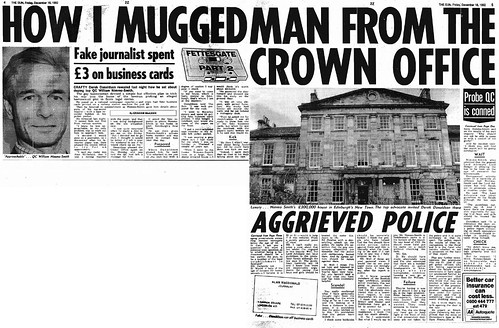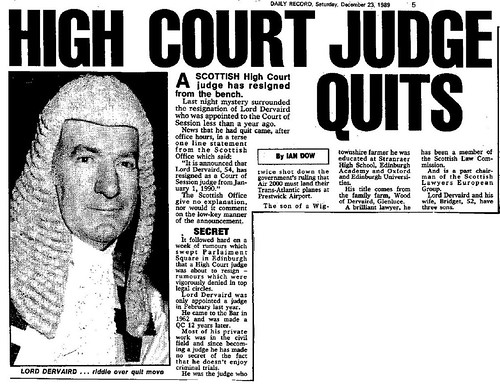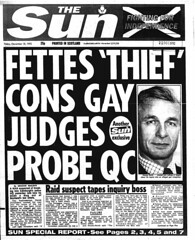 Scottish Arbitration Centre appoints ex Court of Session judge & Cairn Energy legal secretary. LORD DERVAIRD (aka Prof. John Murray QC) the Court of Session judge who STUNNED the Scots legal establishment in the early 1990s by resigning in a cloud of rumours connected to the FETTESGATE ‘Gay Justice Conspiracy' scandal has today been appointed as an Honorary Vice President of the Scottish Arbitration Centre, a ‘joint venture’ opened by the SNP’s Fergus Ewing and backed by the Scottish Government, the Chartered Institute of Arbitrators, the Faculty of Advocates, the Law Society of Scotland and the Royal Institute of Chartered Surveyors (Arbitrate with that lot ? you must be kidding – Ed)
Scottish Arbitration Centre appoints ex Court of Session judge & Cairn Energy legal secretary. LORD DERVAIRD (aka Prof. John Murray QC) the Court of Session judge who STUNNED the Scots legal establishment in the early 1990s by resigning in a cloud of rumours connected to the FETTESGATE ‘Gay Justice Conspiracy' scandal has today been appointed as an Honorary Vice President of the Scottish Arbitration Centre, a ‘joint venture’ opened by the SNP’s Fergus Ewing and backed by the Scottish Government, the Chartered Institute of Arbitrators, the Faculty of Advocates, the Law Society of Scotland and the Royal Institute of Chartered Surveyors (Arbitrate with that lot ? you must be kidding – Ed)
 Fergus Ewing, Jim Mather & Brandon Malone
Fergus Ewing, Jim Mather & Brandon Malone nab create the arbitration business. The Scottish Arbitration Centre made the announcement of the appointment of Lord Dervaird and Hew Dundas to the positions in an announcement which, as of time of publication, is yet to appear on the SAC’s own website. The announcement also gives background on the two appointees, stating “A former Court of Session judge, Lord Dervaird has experience as an arbitrator and as counsel in numerous international arbitration proceedings. He wrote the National Report, Scotland, in the ICCA International Handbook on Commercial Arbitration in 1995. He is Emeritus Professor at the University of Edinburgh, and lectures on international arbitration at London (King’s College) and Strathclyde Universities.” No mention of exactly why Lord Dervaird was a former Court of Session judge was made.
The Scottish Arbitration Centre’s second appointment today was listed as : “Hew R Dundas spent more than 30 years in the oil and gas industry, becoming general manager, legal and company secretary at Cairn Energy plc, before becoming a full time international arbitrator, mediator and expert determiner in oil and gas, energy and general commercial disputes. He made significant input into the Arbitration (Scotland) Act 2010 and has co-authored the definitive book on the Act. He is also a visiting lecturer and/or examiner in international commercial arbitration at several universities.”
Welcoming the appointments, Andrew Mackenzie, chief executive of the Centre, said: “Both men are well known in the world of international arbitration, and will play a vital role in the Centre’s promotion of Scottish arbitration and Scotland as a place to arbitrate”.
The Scottish Arbitration Centre came about after a specific proposal for an arbitration centre was presented by Brandon Malone, solicitor advocate, on behalf of the Scottish Government’s steering group at a meeting last year between Fergus Ewing and representatives of the bodies authorised to act as Arbitral Appointments Referees (AARs) under the Arbitration (Scotland) Act 2010. Mr Malone, who also happens to be Chairman of the Scottish Arbitration Centre, has been involved with the SNP for many years and was the party’s “Assistant Spokesperson on Justice & Equality” in the late 90’s, famed among other things yet to be published, for writing letters in the Scotsman newspaper defending the legal profession.
The much hyped Arbitration (Scotland) Act 2010 pushed through by the SNP Scottish Government aims to promote domestic & international arbitration under Scots Law and, laughably, seeks to promote Scotland as a place to arbitrate disputes, legal & otherwise. (Scotland as a safe place of arbitration or litigation is a ridiculous idea, much better to go to Europe or the London courts – Ed)
Critics of the Arbitration (Scotland) Act 2010 and its passage through the Scottish Parliament point out the legislation was put through Hollyrood at the suggestion of the Scots legal establishment to corner the arbitration market, seen as a lucrative business to be controlled before ‘outside elements’ took it over. The legislation seeks to increase the number of arbitrations under Scots Law while also increasing the level of business for arbitration advisers and the number of appointments of arbitrators based in Scotland, as long as they are agreeable to, or members of, or are under the control of the organisations who back the Scottish Arbitration Centre.
No one from the Scottish Arbitration Centre was available to answer questions and also no one was able to answer questions on what could be achieved by way of arbitration if cases involved the Scottish Government, the Chartered Institute of Arbitrators, the Faculty of Advocates, the Law Society of Scotland or the Royal Institute of Chartered Surveyors (I’d have to say “Steer clear of the whole thing” – Ed)
After one of our reporters made enquiries, a Scottish Government insider warned us not to run the story, and said “there may be consequences if you do” so we thought we would anyway, as we still have a free press until perhaps the First Minister declares otherwise.
By IAN DOW Daily Record 23 December 1989
A SCOTTISH High Court judge has resigned from the bench.
Last night mystery surrounded the resignation of Lord Dervaird who was appointed to the Court of Session less than a year ago.
News that he had quit came, after office hours, in a terse one line statement from the Scottish Office which said : "It is announced that Lord Dervaird, 54, has resigned as a Court of Session judge from January 1 1990."
The Scottish Office give no explanation, nor would it comment on the low-key manner of the announcement.
SECRET
It followed hard on a week of rumours which swept Parliament Square in Edinburgh that a High Court judge was about to resign- rumours which were vigorously denied in top legal circles.
Lord Dervaird was only appointed a judge in February last year. He came to the Bar in 1962 and was made a QC 12 years later. Most of his private work was in the civil field and since becoming a judge he has made no secret of the fact that he doesn't enjoy criminal trials. He was the judge who twice shot down the government's ruling that Air 2000 must land their Trans-Atlantic planes at Prestwick Airport.
The son of a Wigtownshire farmer he was educated at Stranraer High School, Edinburgh Academy and Oxford and Edinburgh Universities.
His title comes from the family farm, Wood of Dervaird, Glenluce. A Brilliant lawyer, he has been a member of the Scottish Law Commission and is a past chairman of the Scottish lawyers European Group. Lord Dervaird and his wife Bridget, 52, have three sons.
The Herald newspaper from Glasgow reported at the time :
Lord Dervaird quits Bench
MARGARET VAUGHAN and BENEDICT BROGAN
23 Dec 1989
COURT of Session Judge Lord Dervaird has resigned after less than two years on the Bench. The Scottish Office announced last night that his decision to leave takes effect on January 1.
This follows a meeting on Tuesday attended by the Secretary of State for Scotland, Mr Malcolm Rifkind, the Lord Advocate, Lord Fraser of Carmyllie, QC, and Scotland's most senior Judge, the Lord President, Lord Hope, during which allegations about Lord Dervaird's private life were discussed.
Independent Television News (ITN) reported at the time :
SCOTTISH JUDGE: LORD DERVAIRD RESIGNS:
SCOTTISH JUDGE: LORD DERVAIRD RESIGNS: Scottish judge, Lord 17.1.90 Dervaird, has resigned over allegations of homosexual TX activity. 2 other Scottish judges have been questioned by colleagues about their private life. There has been no police investigation & there will be no charges.
A selection of front ends from the newspapers of the time :


The Independent newspaper reported at the time :
Calls for inquiry into 'collusion by gay judges'
MARY BRAID
Sunday, 13 September 1992
PRESSURE is growing this weekend for a full inquiry into a leaked police report investigating allegations that homosexuals in the higher echelons of the Scottish legal system may have subverted the course of justice.
Opposition MPs say the report 'strikes at the heart of the Scottish judiciary' and that the allegations in it must be investigated immediately. The report includes the names of a High Court judge, two sheriffs and two other leading members of the legal system.
Looking into the handling of five legal cases, the report concludes that the authors felt that, in one case, the decision to drop charges and prosecution was 'a tactical one . . . to prevent the possibility of evidence being presented which could potentially compromise senior figures in the judiciary'.
One of the cases involved the withdrawal of 47 of 57 charges in a 'rent-boy' investigation shortly before the trial was due to begin. Another concerns an embezzlement surrounding Burnett Walker, a collapsed firm of solicitors, two partners of which were homosexual.
The leak has sparked the latest in a long line of homosexual-related scandals to hit Scottish legal circles since the resignation of Lord Dervaird, a respected High Court judge, in December 1989. Since then there have been rumours that some of the profession's leading lights have been professionally compromised by their homosexuality.
A conspiracy theory has developed which incorporates the suicide in 1988 of Ian Walker, senior partner in Burnett Walker. The leaked report says: 'The instance is one of a well-established circle of homosexual persons in Edinburgh with influence in the judiciary who may, or may not, have exerted that influence, but who have formed associations which in themself lay them open to blackmail.'
The report, prepared for Sir William Sutherland, Chief Constable of Lothian and Borders, was initiated after Tam Dalyell, Labour MP for Linlithgow, complained to Sir William about the handling of some cases.
Yesterday Mr Dalyell denied being the source of the leak. He has written to the Prime Minister asking for a full inquiry. Mr Dalyell, who was interviewed by police yesterday, said that without an inquiry people named in the report might suffer 'a slow trial by tabloid newspapers'.
Alistair Darling, Labour MP for Edinburgh Central, said a full inquiry should be held to put 'the rumours to rest'.
Lothian and Borders police said all allegations of criminal activity had been sent to the Procurator Fiscal. It was up to the Crown Office to decide whether to prosecute and the nature of charges.
The leak comes within weeks of the 'Fettesgate' break-in at police headquarters in Edinburgh. Police refuse to say whether there is any connection.
In a typically Scottish move, an investigation & subsequent report was written by members of the Scots legal establishment on the Fettesgate allegations, clearing everyone (including the church mice who shined the customer’s shoes – Ed). That report, for all its worth can be read online or downloaded as an acrobat pdf, here : the report on an inquiry into an allegation of a conspiracy to pervert the course of justice in scotland by WA Nimmo Smith QC & JD Friel




10 comments:
Personally I would have to say anyone thinking of using Scotland as a point of arbitration must be completely out of their skulls.
gotta love who the snp have got into bed with on this one!
The "Fettesgate scandal", as the incident was quickly called, began in the early hours of 19 July 1992, when burglars spent three hours in the Fettes headquarters of the police force. The break-in, through an unsecured window of the Scottish Crime Squad’s ground-floor offices in the HQ building, led to several confidential documents being stolen and Animal Liberation Front slogans being sprayed on the walls.
Two journalists who reported on the incident after receiving tip-offs were arrested;
* Alan Muir, a reporter for The Sun, wrote a story based on an anonymous telephone call on the day of the incident, and was detained for six hours, and
* Ron McKay, a journalist for Scotland on Sunday found documents after another anonymous call six days later. When he wrote a story based on the documents, he was arrested at dawn, while at his girlfriend's house in Chatham, Kent. He was held overnight, and charged with reset, the crime under Scots law of receiving stolen property. The charges were dropped six months later.
The stolen documents concerned the police's use of "telephone metering"; recording the destination and duration of suspects' telephone calls, without listening in on them. Although this was regarded as legal, the controversy led to a debate about privacy and what safeguards were needed regarding information gathered in this way.
The theft of such sensitive material from what should have been such a secure place, under the very noses of the police, led to questions being asked about the competence of the Lothian and Borders force to take charge of the European summit in Edinburgh later that year.
It transpired that the Animal Liberation Front had not been involved in the break-in. The chief constable later admitted that the treatment of Mr McKay was tactless and apologised to the editor of Scotland on Sunday.
Nobody has yet been charged with the break-in, leading some journalists who have covered the story to believe that the burglar's identity (allegedly a police informer) is known to the police, but that they fear he might embarrass the force in court.
The return of the sensitive files was allegedly the result of senior detectives reaching an immunity deal with a man close to the city’s gay criminal underworld. An internal report is believed to have been completed by the police force on the matter, but has never been released to the public.
"There has been no police investigation & there will be no charges."
Sounds like this was decided before they were even spoken to.
Hear no evil see no evil?
@9:49 AM
yup
lol!
Its daft enough using the Scots legal system so arbitration will be just as bad especially with the LSoS running the show.
what a surprise out with the old and in with the old!
Someone spent 3 hours in Lothian & Borders Police HQ after they had "broken in" and 2 journalists are arrested?
No wonder there were no charges against the judges!
Another case of 'jobs for the boys'.
Does Scottish arbitration give discounts on rent boys?
hahahaha because there are plenty qcs in the rent boy business in Scotland we are not allowed to talk about chuff chuff chuff all those golden boy qcs who parade around on national tv playing the innocent between bungs and dictating morals to the rest of us chuff chuff and no one stands up to say anything about ye gods!
Post a Comment